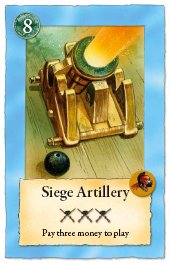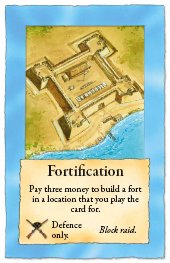Ok, so now we know how to go around expanding on the board, building more cities, adding cards to our deck, and scoring points. That's all well and good but what if we want to punch the other person in the face? Successfully invading the enemy capital is one of the victory conditions, after all, and doing so completely ignores all those fancy points scored through expanding. How does that work?
Starting a fight is very similar to expanding into an empty space on the board. You need to have a card for an adjacent spot on the board and you need to have a card for the appropriate mode of transportation. Those two cards get discarded as normal. On top of them you need a third card with military strength on it. This card gets set aside into a 'fighting' zone and won't get back into your deck until the fight resolves. Military strength is indicated by a crossed musket icon. (Also, coastal cities can be attacked by ships so either player can play a card with a ship icon as though it were 1 strength.) The siege artillery card on the right here has 3 of them, for example. Once a fight has been started each player can then use an action to add another card with military strength to the fight. The absolute amount of strength added doesn't matter; it's the relative difference between the two which counts. There's a track on the board representing this 'tug of war' strength difference.
A fight ends if when you start your turn the tug of war marker indicates that you've won the fight. If you're the attacker this means you have at least 2 more strength than your opponent. If you're the defender this means you have at least 1 more strength than your opponent. When a fight ends the loser has to destroy a non-location card (if any) from the fight then the rest of the cards played by both sides go to the discard piles. In addition if the attacker won the fight they can immediately settle the location as a free action. If the location has a settler symbol on it then they need to play a settler card to do so. Otherwise they can take it for free.
On top of needing a smaller difference to win a fight the defender has a couple other advantages as well. Every city has 1 military strength by default. Some of the cities have additional strength shown on the board. The two British capitals (Boston and New York) have 1 bonus strength each. The starting French cities Louisbourg and Montreal also have 1 bonus strength each and the French capital (Quebec) has two bonus strength. Furthermore if you plan ahead you can build a fort in a city which blocks all raids and gives an extra 2 military strength to the city. Finally the same fortification card can be used as a military strength but only on defense.
The defender has a couple disadvantages. The first is while the fight is taking place the location card for that city becomes unplayable. Having a dead card in your deck is pretty bad. The second is that you don't get to choose when the fight happens so you need to be constantly prepared to defend yourself lest you get blown up.
Each side has access to one card with 3 strength, a few cards with 2 strength, and some cards with 1 strength. One of those cards, the military leader, doesn't take an action to play. As such the most a player can possibly throw into a fight on a single turn is 6. (Their 3, a 2, and the free 1.) Even if someone happens to draw a hand full of military strength they can only play 2 cards into a fight per turn which tends to give their opponent time to draw more military cards too. So while it is certainly possible for someone to get blitzed out in a single attack it turns out with proper planning (using the reserve to store a couple of military cards should your opponent happen to have a deck with lots of military cards in it) you tend to be able to avoid instantly losing. Most fights seem to go the distance where both players get enough time to eventually put every card they want into the fight. As such fights frequently come down to who has managed to get the most total strength into their deck. Military cards are rather expensive so this tends to be the person with the better money engine but sometimes both players actually get to buy all their military cards. Who wins then?
Well, the French have 1 siege artillery, 4 regular infantry (worth 2 each), 3 militia, a military leader, a coureurs de bois, Montreal, and Quebec. If the fight is at sea (and I can count on one hand the number of fights in 99 games finished that didn't take place at sea) they can also potentially include Port Royal, Halifax, Louisbourg, and their single ships card. On defense they could also have 1 normal fortification and 2 neutral fortification cards.
How about the British? They have 1 siege artillery, 7 regular infantry, 3 militia, a military leader, a rangers, Boston, and New York. At sea they also have New Haven, Norfolk, Port Royal, Halifax, and two ships cards. On defense they have 1 normal fortification and 2 neutral fortification cards.
It should be pretty apparent that the British have a huge advantage here. They have 3 extra regulars and potentially 2 more ships. Note that some of those ships overlap (they can't both own Halifax or Port Royal) but even in a worst case scenario the British have as many ships as the French. They basically can't lose a fight on defense with all their cards and are guaranteed to win on offense unless the French manage to fortify in advance and buy both neutral fortification cards. The British just have inevitability on their side. Their deck costs a lot more (the French pay 21 for their 4 regulars and the British have to pay 49 for their 7) but their money engine is easier to put together so it tends to come out ok for them.
One things to point out is that the British path to Quebec involves conquering spaces with ships on them. This means it's actually easier for the British to win future fights once they start winning fights. Especially since the loser of a fight loses a card on defense! Your deck started with at least 3 more strength than your opponent and they lost a card. You gained a card with a ship on it. And they lose access to the card for the next space you attack. This tends to make for snowballing attacks. It works the other way, too. If the French get started attacking and the British don't properly defend then they'll get snowballed too.
How do you defend? Well, you need to match them military card purchase for military card purchase. Since the attacker only needs 3 more strength in their deck to win every fight it only really takes 2 regular infantry to win the game. If your opponent buys one you might be ok but if they buy a second one and you don't respond you just lose. There is one other way to fight back which is via ambushes which will be covered in the next post.



No comments:
Post a Comment